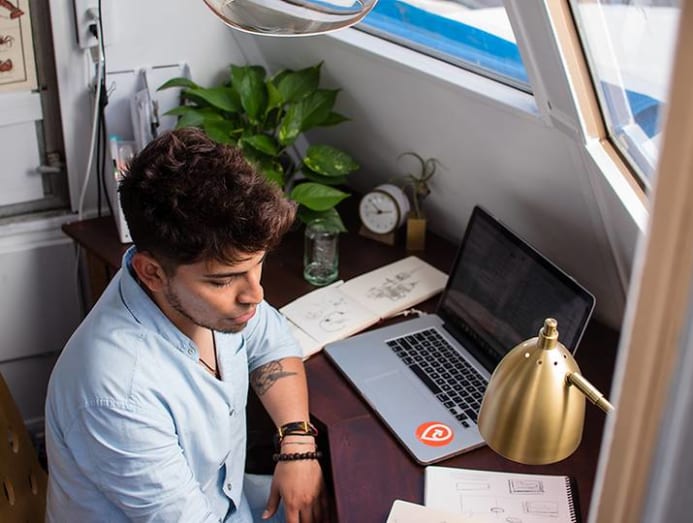COVID-19: How the pandemic could help push us into a greener way of life
Past the fourth dimension this horror ends, it might have changed our manner of life. Already, the coronavirus has achieved something that authorities policies and moral awakening couldn't: It is pushing us into light-green living.
READ> Singapore is becoming a nation of urban gardeners – but is it all that sustainable?
The nature of piece of work, commuting and shopping has inverse. If that transformation sticks, then 1 day we'll take happier and more than productive societies, and we'll await back on December 2022 as the all-time elevation in global carbon emissions.
First of all, the pandemic may show that offices are an outdated way to organise work. This is something I have suspected since my 3-year part experience in the 1990s. I was amazed at the inefficiency of the set-up: People spent much of the twenty-four hour period distracting each other by gossiping, flirting, bitching most the boss or complaining virtually that morning'south commute. I've worked happily alone for 22 years now.
Offices exist largely so that bosses tin check whether workers are doing the work (or at to the lowest degree putting in face up-time). Only nowadays, data can do much of the monitoring. Meanwhile, improved workplace software such as Slack and Zoom lets employees collaborate from abode.

READ> In an historic period of social distancing, here'south how to appreciate the joys of slow living
The tech may really outperform existent life: A professor who has hurriedly learnt Zoom told me he liked the way the software can instantly create small break-out groups of students to work on a trouble. In an auditorium, anybody has to pack their bags, discover a room and grab a coffee on the style.
Now that entire countries are learning to work from their bedrooms, many employers may end upwardly concluding that they can ditch expensive part space. That wouldn't merely reduce emissions, and liberate metropolitan workers from ghastly commutes (the daily circular trip averages well over an hour in cities such every bit New York, Chicago and London).
The shift would also reduce urban firm prices, as some offices become converted into homes, and some workers are freed to exit the city. In the next year or 2, virtual-reality software volition let the dominate (or at least the boss'southward avatar) step into underlings' dwelling house-offices to root out shirking.
In short, work could follow dating, shopping and game-playing in going virtual. That would make life greener but also more isolated. To compensate, neighbourhoods will need more than communal spaces. Already the expiry of bricks-and-mortar retail has immune java shops and co-working spaces to take over high streets. But nosotros'll also have to build more playgrounds (with some for adults), community centres and parks.
Some other benefit: The pandemic may assistance stop the decades-long rise in business concern travel. I discovered last week that each time a trip was cancelled, I mostly felt relief. I know the benefits of business travel: The two books I'm currently writing both came out of meeting someone while at a conference. So did my previous book.
However, most trips probably crusade a cyberspace loss of productivity. While you search for the i or two useful people to talk to amid the 300 carbon-emitting duds at a disappointing conference, you're missing work at home. Moreover, most conferences feature a lot more wannabe sellers than buyers.
Nowadays it's quicker to detect the perfect counterpart on LinkedIn. As for content, well-fabricated virtual conferences could exist as compelling to watch as good TED talks or Goggle box – and more so than the endless panels of executives talking their own books.
Equally for shopping, even before the coronavirus we were shifting towards a world where the store comes to you. That motion but accelerated, possibly for always. Information technology'southward much greener for a supermarket to send an electrical van (or a cargo-cycle) to 100 homes in a neighbourhood than for all those people to drive to the supermarket. Some could ditch their cars.
Even in the very brusque term, the greenish lining to this pandemic is surprisingly large. Air pollution kills about 1.1 million people in China alone every yr. The autumn in pollution during the country'southward lockdown in Jan and February "likely saved 20 times more lives in China than have currently been lost due to infection with the virus in that state", calculates Marshall Burke of Stanford University'southward Section of World System Science. He added: "The fact that disruption of this magnitude could actually lead to some big (partial) benefits suggests that our normal way of doing things might demand disrupting."
That's particularly true since climatic change makes pandemics more than probable. It expands the natural habitat of infectious insects such as mosquitoes, while reducing the habitat of animals, with the result of pushing both into closer contact with humans.
Governments need to make good use of the electric current pandemic. Many states are preparing a fiscal stimulus. Donald Trump wants to bequeath much of it on the carbon emitters that could get bust in the incipient recession: Airlines, cruise ships, oil producers and his beloved hotel manufacture (which lives off travellers' emissions). Frontward-looking governments will instead prioritise green industries, while helping workers who lose their fossil-fuel jobs.
It turns out that developed countries (except peradventure the US) can still practice collective government-led wartime-style mobilisation. It'due south a musculus we're going to need.
"The fact that disruption of this magnitude could really atomic number 82 to some big (partial) benefits suggests that our normal way of doing things might need disrupting." – Marshall Burke
By Simon Kuper © 2022 The Financial Times
0 Response to "COVID-19: How the pandemic could help push us into a greener way of life"
Post a Comment